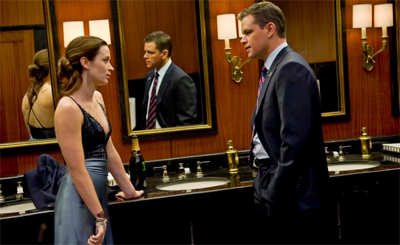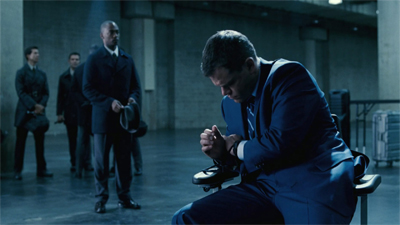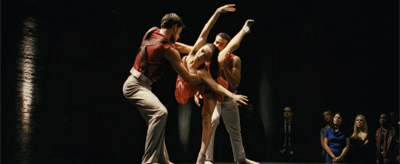This film was seen as part of the Jameson Dublin International Film Festival.
One of the joys of a film festival like the Jameson Dublin International Film Festival is that you get to see films that take you by surprise. Sometimes they are small foreign dramas which will never get a major release here, and thus haven’t been discussed to death on-line or in-print, but occasionally it’s a movie premiere of a big upcoming release which will impress. The Adjustment Bureau is hitting screens around the world next Friday, but film fanatics in Dublin were treated to a sneak peek (the movie’s second public screening and the first in Europe). As a movie that I honestly wasn’t expecting too much of, based on the trailers in front of every major release since last August that seemingly couldn’t decide on the genre of the film, what did I make of it?
I loved it.
As with most movies adapted from a Philip K. Dick short story, The Adjustment Bureau is rather liberal in its adaptation – redrafting the lead character from an insurance salesman to a politician, in one of the smaller changes. However, also like most movies adapted from Philip K. Dick story, the movie has an absolutely intriguing concept at play. Where The Adjustment Bureau moves ahead of the fairly disappointing crop (with a few obvious exceptions like Blade Runner and Total Recall) is in turning that clever concept into a wonderfully engaging and inventive movie.
The plot, for those curious, follows a politician by the name of David Norris. Unfortunately, he is not the Irish politician of the same name – I, for one, would love to see the verbose and enthusiastic civil rights champion take on fatalism, but it is not to be. Instead, like his Irish namesake, this American politician is a man of deep passion and raw oratory power. He’s young and cool, referred to as “the GQ Congressman”. He’s running for Senate, and he’s the type of person you could easily see continuing to higher office. That is, if he can control his self-destructive impulses long enough.
In a moment of despair, Norris meets a young dancer by the name of Elise. Chatting together in the men’s bathroom of the Waldorf hotel, the two strike up a strange bond from a short conversation. When the two meet again by chance on a bus a little time later, it seems that fate may be conspiring to bring them together. However, there are also fairly powerful forces determined to push them apart.
There was a lot of discussion at the premiere about the movie and its genre. There was the frequent suggestion that it was hard to categorise, or that it contained too many elements from multiple genres to safely describe. However, in watching the film, I spotted the DNA of a pure love story. Fundamentally, the story of The Adjustment Bureau is the story of a couple who really want to be together, but who are constantly driven apart. A powerful love story has fate present obstacles for our leads to overcome in order to be together and find happiness. I think that the appeal of this film is how honest it is about that – it’s fairly overt about its nature of a love story, except that it casts “fate” as men in sharp suits and old-fashioned hats.
These mysterious figures exist to make sure that everything follows “the plan.” These are the guys who interfere when you can’t find your keys, or if you spill coffee on yourself. They block mobile phone reception and make sure that there are no taxis running. They manipulate and distort the world, based on the contents of “the book”, containing some grand scheme for mankind. They don’t directly interfere with our minds, but they manipulate us so we make the choices that they feel we should. To these mysterious creatures, we are granted only “the appearance of free will”, and they exist to put “the training wheels” on our bike.
The movie clearly ties these characters to a religious context, with the hats standing in for halos and the mysterious “chairman” who is always “upstairs” standing in for a certain deity. It’s something that one imagines should be tough to pull off, but the movie manages it without breaking a sweat – using a library and sharp suits as stand-ins for heaven and angelic robes works brilliantly. It helps that the movie never takes itself too seriously – there’s always a hint of wit and humour behind certain sequences, but never so much that it undermines what is playing out on screen.
It’s a very clever concept, but it works especially well because George Nolfi recognises that this sort of fatalism is perfectly at home within the framework of a love story. The classic sagas of eternal love create the sensation that the entire world is working as a giant machine against the expression of that undying affection – it’s one giant sinister trap designed to tear them apart. Often this masquerades as family issues, societal pressure, questions of geography or misunderstandings – but Nolfi makes this conspiracy literal. These sharply-dressed men in suits can cause a car crash or a locked door, or even a last-minute rescheduling of a dance practice that will push our leads further apart.
Besides, perhaps no other genre offers a better window to explore the conflict between free will and fatalism than an old-fashioned love story. “If you truly love her, just walk away,” Norris is warned at one point. “If you stay with her, it will not only kill your dreams. It’ll kill hers.” However, isn’t that almost what love is about? About finding someone who matters so much that you accept that life with them is better than any life without them? Doesn’t any decision to pursue true love cost us something dear and, as a result, isn’t it that personal cost or sacrifice which gives that love its value? Love is the ultimate expression of free will, as it often requires us to alter our pre-set trajectories through the world and truly decide what matters to us.
There are, of course, elements of other genres at play. Nolfi handles the movie like an understated thriller. Indeed, the movie works so well because it downplays the fantastical elements. There are doorways which connect the city like some sort of labyrinth for these men to navigate, and they can distort time and space, but all of this is incidental. All that matters is that they want to stop David and Eliza from getting together, and will do anything to keep them apart. It’s never over-the-top or out-of-control, but it is tense and exciting. Wonderful on-location work certainly helps, as the viewer gets the impression that the characters are really moving through the city, rather than some generic metropolis (Toronto?).
Of course, all this means nothing if the two leads can’t carry the film. So I was stunned at how effective the chemistry between Matt Damon and Emily Blunt was. The movie has to be economical with the romance, due to the sheer volume of material to be covered, so that puts a lot of pressure on the performers to establish the shared connection. That first scene, in the bathroom, is impressive. It’s the moment that the film grabbed me, and I don’t think it ever really let go. It’s a short sequence, but Damon and Blunt manage to seem so deeply in synch that it’s powerful. Given how much the movie is about keeping them apart, it’s remarkable that they seem so wonderfully matched throughout the film. I definitely think it’s one of the best big-screen pairings I have seen in years, and that’s no exaggeration.
That says nothing of the rest of the cast. Anthony Mackie is great as perhaps the most conflicted of these mysterious figures, while John Slattery puts in a solid supporting turn as the low-level officer tasked with stopping the romance before things get out of hand. However, it’s Terence Stamp who steals the show as Thompson. “Just remember,” he advises Norris as coldly as only Terence Stamp can, “we tried to reason with you.” Stamp is one of those great actors who only really gets a chance to shine occasionally, but the movie really makes the most of it. Here he gets a genuinely impressive monologue which rather brutally justifies the meddling in human affairs.
Much like the ominous Thompson, the movie works because of its elegant simplicity. The notion of free will, and particularly whether any of us are mature enough to hold it, is a potent one – and it would be easy for the film to get bogged down in existentialist debate. However, Nolfi manages to provoke thought while still offering a solidly entertaining movie on its own terms. It’s smart and sophisticated, but never sacrifices any wit or charm in the process. I think we have the first true winner of 2011.
I don’t normally score my reviews, but the Jameson Dublin International Film Festival does give an “audience award” and asks the audience to rate the film out of four. In the interest of full and frank disclosure, my score is: 4.
Filed under: Non-Review Reviews | Tagged: Adjustment Bureau, blade runner, David Norris, dublin, Emily Blunt, films, George Nolfi, jameson dublin international film festival, matt damon, Movies, non-review review, Philip K. Dick, premieres, review, Terence Stamp, total recall |


























Watching the trailers, it reminded me heavily of Dark City. Did you notice any similarities?
There’s quite a few, from underlying themes (self-determination vs. fatalism) to things like men in suits and hats controlling the physical world. However, there’s a huge difference in tone – Dark City is more of a mystery thriller with a cleverly-phrased existential philosophy question, while The Adjustment Bureau is a romantic adventure with some more abstract ideas on human free will. Using the word “accessible” in an entirely objective fashion (as a lot can be read into that single word), I’d say this is more accessible, but it lacks some of the complexity of Dark City. On the other hand, it’s perhaps a more emotional film, as compared to Dark City’s cerebral approach. It’s like comparing apples and oranges – but they’re both round fruits that grow on trees.
That’s cool. I was worried it would be too derivative. I can’t wait to see it!
Glad to hear this is one to look forward to. The fact that it was pushed back to a February release was very worrisome even though I’m a sucker for romantic sci-fis.
February and March are the new summer, Castor! Nah, I find taht there’s a lot of quirkier love-it or hate-it fare buried among the debris. After all, this is where we had Kick-Ass and I Love You Phillip Morris last year. And, for me at least, Shutter Island.
Glad to hear you saw lots of good movies at Jameson Dublin International Film Festival, Darren. I too had trepidation about this one though the trailer was somewhat intriguing and I love Emily Blunt, but glad you like this one, I might check it out in the theater now.
Thanks, it’s well worth a look. Although I have to concede that I am somewhat surprised at how many people loved the trailer. I actually thought the trailer looked fairly bland, and was blown away by the film.
I’ve been really looking forward to this. Glad to hear you liked it.
Cool, I really enjoyed it. As I remarked above, March is increasingly become the place where quirky and hard-to-classify films end up. Sure, it occasionally misfires, but we’ve got more than a few decent movies in this month in recent years.
You saw this already? You saw this already. You saw this already. My jealousy knows no bounds. None.
I’m not joking when I say this is one of my most anticipated movies of 2011. You lucky bastard. Can’t wait to see it myself and share my thoughts, and let me tell you it means a lot to see such a positive response from you.
Thanks Andrew. In fairness, as an Irish cinema fan, this is like the one movie I’m going to get to see ahead of the Americans this entire year, so I might as well milk it.
We saw the Adjustment Bureau last night and I truly loved it. Matt Damon and Emily Blunt’s had such great chemistry. I loved reading your blog about the movie. I also wrote a review on my blog =)
http://solittletimeheresmine.blogspot.com/2011/03/movie-review-of-adjustment-bureau.html
Thanks Pia, glad you enjoyed it.
It packs a little of everything into an entertaining package: love story, mystery, action and discussion about free will and fate. Good review, check out mine when you can!
Thanks!
I enjoyed this movie (Emily Blunt is as per usual a delight) however the ending let it down I feel. It didn’t really have an ending – it just seemed to stop as it they could not think of a good way to end the movie.
I remain fonder of this one than most, I must concede.